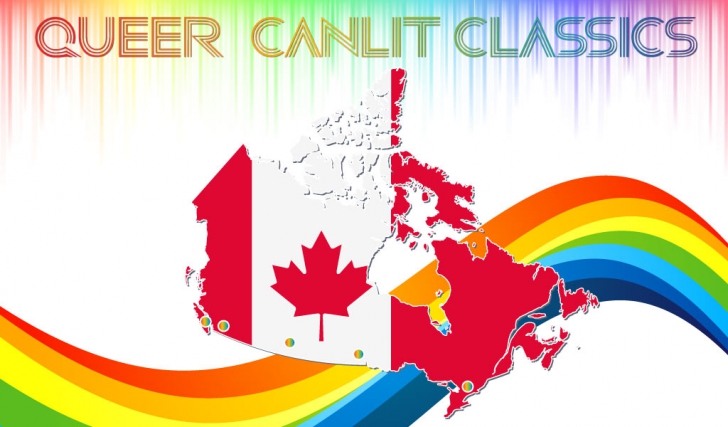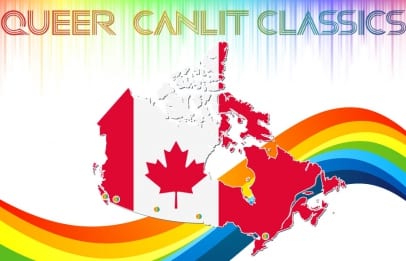
(Plenitude’s project paints a virtual map of queer CanLit hotspots./Daily Xtra image)
A year ago, Canada’s queer literary magazine asked authors across the country to start naming names.
Which authors shaped you, Plenitude Magazine wanted to know. Whose work fuelled your coming out, inspired your choices, influenced your paths? Whose words do you want other readers to discover?
Answers soon arrived from writers across Canada.
Poets and novelists from Victoria, Vancouver, Kelowna, Nelson and Calgary happily shared memories of books that had personally nurtured them or inspired their own writing. Authors in Ontario, Quebec and the Maritime provinces described overlooked, nearly forgotten, obscure-but-beloved, and prize-winning titles that they believed others would benefit from knowing or revisiting.
By the end of 2014, Plenitude Magazine started posting the assorted responses. Opening with Toronto’s Elizabeth Ruth, about 50 writers have since contributed pieces about favourite books.
Taken together, they form a virtual map of queer CanLit hotspots and a mini-library of titles, from Suniti Namjoshi’s “wonderfully offbeat” The Conversations of Cow (recommended by Kelowna’s Anne Fleming) to Tennessee Williams’ little-known novel Moise and the World of Reason (which Halifax’s Darren Greer praised to the rafters).
Responses range from the deeply personal (Victoria’s John Barton chose Ian Young’s 1969 poetry volume, Year of the Quiet Sun), to a beloved classic (Vancouver children’s author and poet Alan Woo lauds Wayson Choy’s 1995 novel, The Jade Peony), to a classic-in-the-making (Nelson’s Jane Byers celebrates Adult Onset, Ann-Marie MacDonald’s latest novel).
They also include a historical gem (Vancouver’s Carellin Brooks implores us to read Jane Rule’s The Young in One Another’s Arms), and an independent press charmer (Alex Leslie, another Vancouver writer, chose Casey Plett’s A Safe Girl to Love).
Republished in part here, in collaboration with Plenitude Magazine, this first queer sampling of writers recommending writers introduces names and titles sure to satisfy and enthral. Just in time, since the famous Canadian winter has already begun to announce itself.

Allan Woo, author, children’s books
One of the most influential books for me as a gay Asian-Canadian writer has to be Wayson Choy’s The Jade Peony. It tells a tale of what growing up in Chinatown Vancouver back in the 1930s and 1940s was like.
Told in three sections, the book splits up the narration between three family members. One of those family members just happens to be gay, which is hinted at ever so subtly yet manages to be beautifully striking at the same time. By exploring the character’s sexuality, Choy manages to make me feel as though I belonged and that the story I have to tell is important too.
I had the chance to interview Wayson Choy a few years ago for a magazine and we talked a lot about his life growing up in Chinatown Vancouver and being gay. The story he weaves in The Jade Peony comes from experience and wisdom, heartache and redemption.
This is an important piece of gay, as well as Asian-Canadian, literature. It definitely helped me find my voice as a writer and gave my point of view some much needed affirmation. Thank you Wayson for your continued inspiration!

John Barton, poet
I came upon Ian Young’s Year of the Quiet Sun in the mid-1970s, either on the bottom shelf of the poetry section in a Calgary bookstore or, worse, in the remainder bin.
I’m not sure if I realized then that it explored themes of love between men but, decades later, research revealed it to be the first openly gay book of poetry published in Canada by a mainstream press.
To echo its title, this is a quiet landmark. With the careful artlessness of Cavafy and like the pillow books of oriental poetry, all floating on an unselfconscious stream of calm, these poems of a young man about the young men he loves arrest me still with a simplicity poets often give up as their vocation matures:
“When the boy undressed / I saw on his left shoulder / a blue tattoo— / …Later, I half expected it / to peel off / in my mouth.”
I don’t know where you’ll find this book, but Ian Young is one of our forefathers.

Anne Fleming, author
If you scan my bookshelves you can pick out the books I gobbled up coming out in the ’80s — the green-spined Virago re-issues of lost women’s classics, the zebra-striped spines of The Women’s Press with the little clothes-iron colophon (so clever! so ironic!) and “Steaming ahead!” motto, the Press Gang books, the balloon-lettered Firebrand books. Sigh. Women’s presses.
The Women’s Press — and let’s not leave out the Toronto Women’s Bookstore — was how I came to The Conversations of Cow by Suniti Namjoshi, a wonderfully offbeat little volume in which a fictionalized Suniti, then living in Toronto, meets Cow of a Thousand Wishes, the goddess, and invites her to become her travelling companion.
The two of them contort through a comic series of Cow’s manifestations — gorgeous Bhadravati, gruff Bud — and Suniti’s figuring out who to be in relation to her until they pretty much live happily ever after.
It delighted me then for its sauciness, its lightness, its boldness and verve, its visit to a commune of lesbian cows. If the delight is the slightest bit rubbed off now, the book compensates with an added ting of historical interest. I’m sure there are still communal lesbian farms out there, but I haven’t been to one since summer solstice, 1985.

Alex Leslie, author and poet
Casey Plett’s A Safe Girl To Love is a book of stories about friendship, parenthood, celebrating and fearing your identity, and the rough road to finding community.
I love Plett’s book for the brave sweep of relationships — a parent/child bond between two trans women; a friendship that begins in a bookstore, includes a trip to a trans woman’s conservative religious home community, and ends, as many friendships do, with an email; and a new, breathless relationship between two young women.
Jane Byers, author and poet
Many years ago in Toronto, I had the pleasure of seeing Ann-Marie MacDonald and her mother on stage at Five Feminist Minutes.
Her mother read tea leaves and Ms MacDonald provided comic relief. Somewhere in the thick middle of Adult Onset, the lesbian protagonist, Mary Rose, takes her mother to Five Feminist Minutes shortly after her mother has embraced the protagonist’s relationship with the new girlfriend.
It was a glimpse into the author’s admission, when I recently saw her interviewed, about how much autobiographical material has been mined in the writing of this novel. Much of this book felt like the author had used my own life experience.
I was particularly affected by the question that Mary Rose struggles with from page one — what to do with all the rejection and homophobia that her parents had flung at her before they finally came around to accept their daughter’s ‘lifestyle.’
So many of us are left with how to live on after the disappointment and pain from loved ones is hurled our way during and after coming out — or, for that matter, while growing up.
Another resonant queer theme emerges from the pages: reconciling a life in the mainstream after living for so long in the fringes.
Interestingly, this work of art seems to be imitating life: with a top spot on the Globe and Mail’s bestseller list, Ann-Marie MacDonald’s latest work has seemingly shattered RM Vaughn’s so-called lavender ceiling.

Darren Greer, author
Like F Scott Fitzgerald’s Tender is the Night, Leonard Cohen’s Beautiful Losers or William S Burroughs’ Naked Lunch, Tennessee Williams’ experimental novel Moise and the World of Reason is a thinly disguised pan-dimensional portrait of the writer himself — a scathing, ironic, and at times hilarious blueprint of his fears and neuroses and, in Williams’ case, internalized homophobia.
But what makes Moise — Williams’ only novel, and a commercial and critical failure when published in 1972 — unique is the combination of post-second World War disillusionment and the sexual revolution (that grew out of it in cities like New York, where the novel is set).
The book powerfully indicts a homosexual subculture that has become so enamoured of its sexual freedom that it runs the risk of becoming enslaved by it. Prophetic, hilarious, and superbly written in a brazen experimental style, Moise needs to be read and studied by every gay male writer even considering writing an autobiographical novel.
And Tennessee Williams should be dusted off in turn and added to the pantheon of vitally important gay 20th century writers, a place that has never been secured for him on the strength of his plays alone.
(For more queer CanLit picks, read part two of Plenitude’s author recommendations, published on Daily Xtra on Tuesday, Nov 10.)

 Why you can trust Xtra
Why you can trust Xtra


